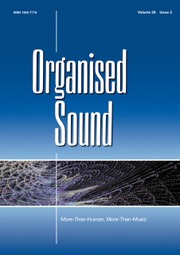Article contents
Absolute pitch accessible to everyone by turning off part of the brain?
Published online by Cambridge University Press: 06 October 2004
Abstract
Absolute (or perfect) pitch exists in fewer than 1/10,000 of the adult population and many claim that it cannot be taught. On the other hand, research suggests that the mechanisms for absolute pitch exist in us all but access is inhibited during early maturation. We here argue that this inhibition can be switched off by artificially turning off part of the brain, allowing everyone access to absolute pitch. This possibility has profound implications for understanding the strategies adopted by the complex networks of the mind. We describe agent-based modelling techniques to understand the computational rationale for these inhibitory processes and to develop new artificial music recognition and synthesis techniques.
- Type
- Research Article
- Information
- Copyright
- © Cambridge University Press 2004
- 7
- Cited by




